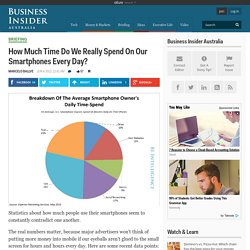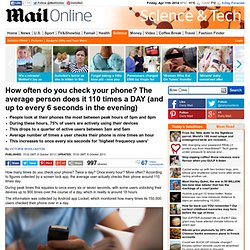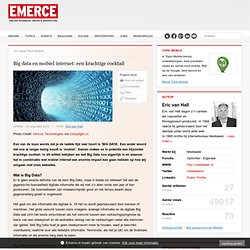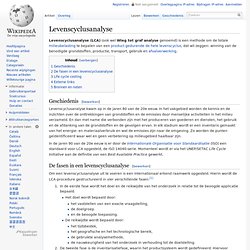

Google-topman vreest 'race tussen computer en mens' 'Wie niet mee is, is gezien' The Toll of Office Disruptions. The Biggest Office Interruptions Are... How Much Time Do We Really Spend On Our Smartphones Every Day? Statistics about how much people use their smartphones seem to constantly contradict one another.

The real numbers matter, because major advertisers won’t think of putting more money into mobile if our eyeballs aren’t glued to the small screen for hours and hours every day. Here are some recent data points: In her Internet Trends 2013 slide presentation, Mary Meeker tells us that we check our phones 150 times a day, between apps, voice calls, texts, and utilities. That seems like a lot. If each interaction lasted an average of one minute, that would mean we are on our phones for over two hours a day. Which is it: do U.S. consumers spend an hour a day on their smartphones, or two hours? To begin with, Flurry includes tablet app usage, and Experian only tracks smartphones. Flurry’s data comes from the hundreds of thousands of apps globally that have the company’s analytics technology installed. Experian Marketing Services uses a consumer panel.
To sum up: How often do you check your phone? The average person does it 110 times a DAY (and every 6 seconds in the evening) People look at their phones the most between peak hours of 5pm and 8pmDuring these hours, 75% of users are actively using their devicesThis drops to a quarter of active users between 3am and 5am Average number of times a user checks their phone is nine times an hourThis increases to once every six seconds for 'highest frequency users' By Victoria Woollaston Published: 15:02 GMT, 8 October 2013 | Updated: 15:03 GMT, 8 October 2013 How many times do you check your phone?

Twice a day? Once every hour? During peak times this equates to once every six or seven seconds, with some users unlocking their devices up to 900 times over the course of a day, which in reality is around 18 hours. Big data en mobiel internet: een krachtige cocktail. Photo Credit: infocux Technologies via Compfight cc Een van de buzz words dat je de laatste tijd veel hoort is ‘BIG DATA’.

Een ander woord dat ons al langer bezig houdt is ‘mobiel’. Samen maken ze in potentie een bijzonder krachtige cocktail. In dit artikel bekijken we wat Big Data nou eigenlijk is en waarom het in combinatie met mobiel internet een enorme impact kan gaan hebben op hoe wij omgaan met onze websites. Wat is Big Data? Er is geen exacte definitie van de term Big Data, maar in brede zin refereert het aan de gigantische hoeveelheid digitale informatie die wij met z’n allen sinds een jaar of tien produceren.
Het gaat om alle informatie die digitaal is. Big Data kun je onderverdelen in twee soorten: Gestructureerde data: Gestructureerde data is informatie die bestaat uit een aantal duidelijk herkenbare componenten. Gestructureerde en ongestructureerde data zijn op hun beurt allebei weer onder te verdelen in: Attention economy. BrainChains. Theo Compernolle MD., PhD.
Levenscyclusanalyse. Levenscyclusanalyse (LCA) (ook wel Wieg tot graf analyse genoemd) is een methode om de totale milieubelasting te bepalen van een product gedurende de hele levenscyclus, dat wil zeggen: winning van de benodigde grondstoffen, productie, transport, gebruik en afvalverwerking.

Geschiedenis[bewerken] Levenscyclusanalyse kwam op in de jaren 80 van de 20e eeuw. In het vakgebied worden de kennis en de inzichten over de onttrekkingen van grondstoffen en de emissies door menselijke activiteiten in het milieu verzameld. En dan met name die verbonden zijn met het produceren van goederen en diensten, het gebruik en de afdanking van de grondstoffen en de gevolgen ervan. In elk stadium wordt er een inventaris gemaakt van het energie- en materiaalverbruik en wat de emissies zijn naar de omgeving. In de jaren 90 van de 20e eeuw is er door de Internationale Organisatie voor Standaardisatie (ISO) een standaard voor LCA opgesteld, de ISO 14040-serie.
De fasen in een levenscyclusanalyse[bewerken] Daniel Goleman - Emotional Intelligence.